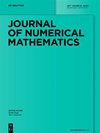Optimal evaluation of symmetry-adapted n-correlations via recursive contraction of sparse symmetric tensors
IF 4
2区 数学
Q1 MATHEMATICS
引用次数: 0
Abstract
We present a comprehensive analysis of an algorithm for evaluating high-dimensional polynomials that are invariant (or equi-variant) under permutations and rotations. This task arises in the evaluation linear models as well as equivariant neural network models of many-particle systems. The theoretical bottleneck is the contraction of a high-dimensional symmetric and sparse tensor with a specific sparsity pattern that is directly related to the symmetries imposed on the polynomial. The sparsity of this tensor makes it challenging to construct a highly efficient evaluation scheme. The references [10, 11] introduced a recursive evaluation strategy that relied on a number of heuristics, but performed well in tests. In the present work, we propose an explicit construction of such a recursive evaluation strategy and show that it is in fact optimal in the limit of infinite polynomial degree.通过稀疏对称张量的递归收缩优化对称适配 n 相关性评估
我们全面分析了一种用于评估在排列和旋转下不变(或等变)的高维多项式的算法。这项任务出现在多粒子系统的线性模型和等变神经网络模型的评估中。理论上的瓶颈在于高维对称稀疏张量的收缩,这种张量具有特定的稀疏性模式,与多项式的对称性直接相关。这种张量的稀疏性使得构建一个高效的评估方案具有挑战性。参考文献[10, 11]介绍了一种递归评估策略,它依赖于一些启发式方法,但在测试中表现良好。在本研究中,我们提出了这种递归评估策略的明确构造,并证明它在无限多项式度的极限中实际上是最优的。
本文章由计算机程序翻译,如有差异,请以英文原文为准。
求助全文
约1分钟内获得全文
求助全文
来源期刊
CiteScore
5.90
自引率
3.30%
发文量
17
审稿时长
>12 weeks
期刊介绍:
The Journal of Numerical Mathematics (formerly East-West Journal of Numerical Mathematics) contains high-quality papers featuring contemporary research in all areas of Numerical Mathematics. This includes the development, analysis, and implementation of new and innovative methods in Numerical Linear Algebra, Numerical Analysis, Optimal Control/Optimization, and Scientific Computing. The journal will also publish applications-oriented papers with significant mathematical content in computational fluid dynamics and other areas of computational engineering, finance, and life sciences.

 求助内容:
求助内容: 应助结果提醒方式:
应助结果提醒方式:


